Today my grandson Kaiden was riding our 24-year-old gelding, Khami. Kaiden slipped or stuck his leg out, I don’t know which, and Khami stopped. Kaiden said he felt like he was falling off.
What I love about this is that Khami knew to stop as I was walking at his side and didn’t know about the slip until it had happened. He knew to stop so Kaiden could regain his balance. The two of them were so totally tuned-in to each other. Oops, I slipped. Here, wait minute, let me stop so you can get your seat right.
I think that Khami would always help a child stay on him. But he has also been a horse that has had a little ADHD at times. Yet when he has a job to do he takes it very seriously and has perfect focus.
Kaiden’s job is to learn the Liberty Foundations as he is learning to ride. You are never too young or too old to learn the Foundations. It teaches you respect for your horse and at the same time, yourself. Kaiden has a natural way with horses and they want to be around him. It helps the horse to tune in when his rider or handler is really well connected and understands him. Kaiden sometimes does some side-by-side walking and greeting before or after he rides.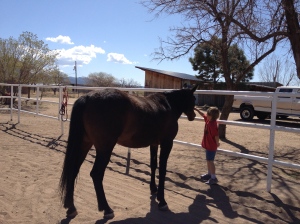
The other thing about this is that horses that are caretaking are worth their weight in gold. That’s one of the qualities we’re working on achieving with the Liberty Foundations, but it isn’t always a part of all horses in the beginning. How a horse can stop moving, shift his weight, or otherwise work to keep you on his back demonstrate caretaking. They show this with each other as well. I once knew of two horses who helped a blind horse by standing on either side of him and walking with him, leading him to the hay when it was put out. They also led him to water.
I want this quality in a horse for the obvious reason of taking care of a child, but I also want that horse to take care of me – on the trail, in a scary situation, or when I need him to move quickly out of the way of danger. I also want to depend on the horse’s especially highly tuned-in senses to things people can’t sense and don’t know about until after they have happened.
An example of this is once a friend and I were riding and she wanted to ride her horse in the tall grass next to a pinon tree. He refused to go there. She kept urging and urging him and he was obviously hesitant and wouldn’t go there. He was ordinarily very willing. Then a big rattlesnake, we called it the “Mother of all Rattlesnakes,” reared its huge head in the grass and we could hear his rattles clearly. Her horse was fortunately far enough away not to get bitten, but he knew — sensed the snake as its scales slid along the earth, the movement of the grass, sensed its aliveness — when neither of us had a clue.
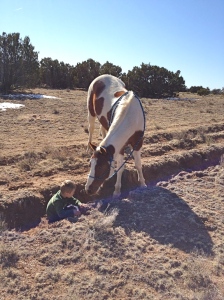 Remember that scene in the movie The Black Stallion where the stallion charges in and stomps the deadly cobra to death before he can strike at the boy? Yes, I know it was Hollywood, but it stands out in my mind as a possibility as our interspecies bonds grow.
Remember that scene in the movie The Black Stallion where the stallion charges in and stomps the deadly cobra to death before he can strike at the boy? Yes, I know it was Hollywood, but it stands out in my mind as a possibility as our interspecies bonds grow.
The more naturally the horse has been raised, the more highly tuned-in they may be. When we try to get the horse to override his natural intuition about danger such as the rattlesnake, it causes a breach of trust because we’re not honoring his understanding of the universe. Instead of taking it personally and thinking, well, I’m not letting him get away with this, how about considering the possibility that the horse could be right?
We all know that on the other hand, horses can be afraid of things that aren’t really frightening – a flapping tarp, a plastic bag stuck to barbed wire fencing, large rocks, etc. but it is still good to give them the benefit of the doubt and help them through those smaller fears. This builds their confidence and their trust in us. And they can reward us on another occasion with their great sense of things and what they can teach us.
Having a job to do also makes a horse very proud and feel important. After I had a serious injury once, I saw my horses come forward with amazing support for me, helping me get back in the saddle again. Teaching a child, sidepassing to open and close gates, obstacles, are all things that help a horse feel handy and needed.
This I believe, is the start to developing a caretaking horse.
****
(copyright: Susan Smith, OrthoHorse)
Services: Bodywork (Ortho-Bionomy for people, Equine Ortho-Bionomy): private sessions, tutorials, phone consultations, distance healing communication and gift certificates
Liberty Coaching: clinics, mini-clinics, workshops, private and semi-private sessions, tutorials, consultations: by appointment: 505.501.2478 or emailing susansmith@orthohorse.info Winter Lessons – semi-private, private and small group sessions. Scheduling now. Contact me for details.
On the schedule for 2014:
March 1-2 Horses at Liberty Foundation Training Weekend Clinic, DeLand, Florida. Still spots available– book today! Space is limited. Contact Anne Daimler, tdaimler@cfl.rr.com (386-822-4564) or myself for registration and information. Space is limited. Private bodywork sessions and lessons are being scheduled now.
April 5-6 Spirit Horse Ranch Liberty Foundations Clinic, Jones Oklahoma, Presented by coaches Ruella Yates and Susan Smith. Contact Ruella Yates ruella@libertyfoundations.com, (405-771-4274) or myself for registration and information. Space is limited. Private bodywork sessions and lessons are being scheduled now.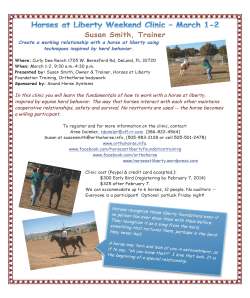



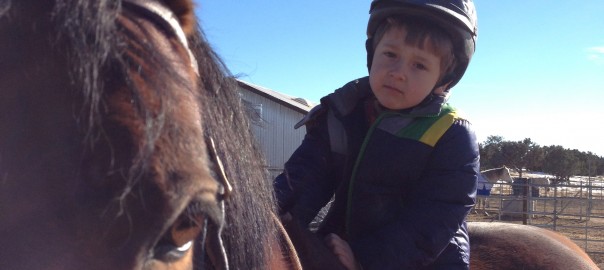
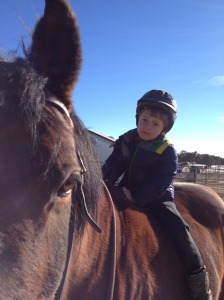

I have one. A “caretaking” horse, and I could not be more thankful, as I am in my 60’s, with physical ailments, and she is very attuned to my needs. There is nothing that compares with this. Lovely post, Susan!
Thanks, Leta. Yes, they are the best!
What I lovely post. I shall enjoy reading here quite a bit. 🙂
Please stop by http://thecasualphilosopher.wordpress.com/2013/04/28/my-first-wordpress-award/ to pick up your award. I nominated you because this is such an educational site. I look forward to visiting often!
Reblogged this on Body Language and commented:
Find out how to nurture a caretaking horse…
Very interesting blog today, Susan. I love your true stories backing up the advice on developing caretaking leadership!
Ruella Yates
Spirit Horse Ranch Liberty Foundations